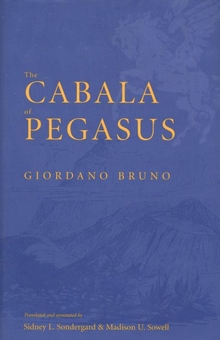The Cabala of Pegasus
WARNING
You are viewing an older version of the Yalebooks website. Please visit out new website with more updated information and a better user experience: https://www.yalebooks.com
Giordano Bruno; Translated and annotated by Sidney L. Sondergard and Madison U. Sowell
Giordano Bruno’s Cabala del cavallo pegaseo (The Cabala of Pegasus) grew out of the great Italian philosopher’s experiences lecturing and debating at Oxford in early 1584. Having received a cold reception there because of his viewpoints, Bruno went on in the Cabala to attack the narrow-mindedness of the university--and by extension, all universities that resisted his advocacy of intellectual freethinking.
The Cabala of Pegasus consists of vernacular dialogues that turn on the identification of the noble Pegasus (the spirit of poetry) and the humble ass (the vehicle of divine revelation). In the interplay of these ideas, Bruno explores the nature of poetry, divine authority, secular learning, and Pythagorean metempsychosis, which had great influence on James Joyce and many other writers and artists from the Renaissance to the modern period.
This book, the first English translation of The Cabala of Pegasus, contains both the English and Italian versions as well as helpful annotations. It will have particular appeal to all Renaissance scholars and those interested in the Renaissance cabalistic underpinnings of modern literature.
The Cabala of Pegasus consists of vernacular dialogues that turn on the identification of the noble Pegasus (the spirit of poetry) and the humble ass (the vehicle of divine revelation). In the interplay of these ideas, Bruno explores the nature of poetry, divine authority, secular learning, and Pythagorean metempsychosis, which had great influence on James Joyce and many other writers and artists from the Renaissance to the modern period.
This book, the first English translation of The Cabala of Pegasus, contains both the English and Italian versions as well as helpful annotations. It will have particular appeal to all Renaissance scholars and those interested in the Renaissance cabalistic underpinnings of modern literature.
Sidney L. Sondergard is professor of English at St. Lawrence University. Madison U. Sowell is professor of Italian and comparative literature at Brigham Young University.
An alternate selection of Readers' Subscription
“This [is the] first full English translation of Bruno’s Cabala, and the event is an important one to which the book does justice. . . . The translation by Sondergard and Sowell . . . [is] extremely readable.”—Hilary Gatti, Renaissance Quarterly
“Simply as text with translation, The Cabala of Pegasus would be most valuable, but the notes and commentary make it better yet. This book is an important addition to the understanding of Bruno and of Renaissance hermeticism generally.”—Thomas Willard, University of Arizona
“Sondergard and Sowell’s erudition is a perfect match for their learned subject, Giordano Bruno, whose highly literate, bitingly satirical dialogue they deftly render for the instruction and delectation of an English-speaking audience. They are equally adept at capturing the numerous linguistic and philosophical nuances of the text and at elucidating its many arcane allusions. All in all, a magnificent achievement that makes the thought and passions of this late 16th-century philosopher come to life for us today.”—Christopher Kleinhenz, professor of Italian, University of Wisconsin, Madison ok to edit
"This is the first complete English translation of Giordano Bruno’s The Cabala of Pegasus. The authors are well suited to this project, for preparation and background, and are to be complimented for their diligence and competence in translation, which becomes an accurate reflection of Giordano Bruno’s thought. Such a proposal is unique. Every scholar, historian, and Renaissance specialist will find this book indispensable as a precious key for the complete understanding of Renaissance ideology."—Mauda Bregoli-Russo, Professor of Italian at University of Illinois-Chicago
ISBN: 9780300092172
Publication Date: October 11, 2002
Publication Date: October 11, 2002
256 pages, 5 1/2 x 8 1/4


